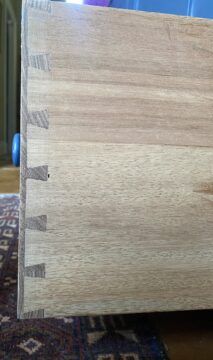by Martin Butler

My favourite lesson in secondary school played no part in my future career but nevertheless enriched my life immeasurably. Despite being a sleepy rural school very low down the pecking order it had fully equipped woodwork and metalwork workshops. Woodwork was my favourite subject by far. This was in the days when there was a gender split – girls doing something called ‘domestic science’ while the boys did woodwork and metalwork. Woodwork lessons were very straightforward. The teacher – Mr Carpenter (can you believe!) – would demonstrate standard joints, starting with a simple halving joint, and then we would each go to our benches and have a go at producing something as near as possible to what he had produced. By the end of the first year we were making half-blind dovetails which require considerable care and precision. All done with hand tools alone. Once we had mastered the basic joints, we were free to make whatever we wanted. Along with art and sport it was one of the few subjects in which it was possible to excel without having to write anything down, which for me was a blessing. Of course, we would sketch out plans, but these were always very provisional and often bore little resemblance to the final product. You were judged on the product alone, not on your workings.
Mr Carpenter told us that in maths if you got 9 out of 10 it was pretty good, but in woodwork if 9 out of ten joints were good and the 10th bad, your creation was likely to fall to pieces. The laws of physics ruled. As with other crafts, woodwork requires patience and practice. Wood makes demands that have to be met if you are going to produce anything worthwhile, imposing a kind of natural discipline that comes not from some authority figure but from the physical world itself. The digital world is binary, you either know the right clicks to make, the right options to pick on a drop-down menu, or you don’t. In contrast, hand-crafts are essentially qualitative.
With practice you move along a spectrum – from not very good to just about passable, then to precise and quite impressive. This goes hand-in-hand with the mastery of hand-tools: awkward and unwieldly at first, one reaches a state in which the tool becomes an extension of the body, almost invisible and completely taken for granted. I remember the deep sense of satisfaction, which I still get, after producing a tightly fitting, although not too tight, mortise and tenon joint. And of course unlike much of what you learn at school, physical skills are not forgotten – like swimming or riding a bike – consequently I still benefit from the woodwork skills learnt with Mr Carpenter.
Feeling at home with a craft skill is surely as important as being numerate or literate. It can be a significant source of well-being for many children, as it was for me. These very practical subjects, however, went out of fashion and became the butt of jokes – having a CSE in woodwork was regarded as the height of non-achievement at school. Woodwork became something called ‘Design and Technology’ which intellectualised the subject so that design, planning and evaluation were what counted rather than the practical skills acquired. There was no place for the systematic learning of traditional skills. The act of making a physical object was downgraded in favour of what was written about it, and woodwork fell victim to the academic/non-academic divide. Everything had to be academic since the non-academic was infra dig, so even non-academic subjects had to be given an academic veneer. Of course, going back to Plato, as we shall see, western culture has always given a premium to the academic over the non-academic. But in modern state education (in the UK at least) this has become extreme, together with an obsession with so-called STEM subjects (Science, Technology, Engineering and Maths). The thinking here is that this is where all the well-paid jobs of the future will be. It might be thought reassuring that technology and engineering get included here, since these subjects at least suggest a practical dimension. But this is misleading since exam entries for Design and Technology – mentioned earlier – have dropped by between 70% and 80% in the last 13 years.[1] So the last vestige of a practical hands-on craft subject is in serious decline. STEM within the school curriculum seems to mean science and maths only. In a world where we recognise neurodiversity it is odd that in educational terms we only recognise a narrow way range of human excellence.

It might be thought reasonable to argue that woodwork is no longer relevant to the world of work, where mass production and industrial processes are what matter. But the original reason for including practical skills like woodwork in the curriculum at schools like mine was not because it was envisaged that many of us would end up as professional carpenters – school is not training for specific jobs – it was simply because it was thought that a balanced curriculum should include both hands-on practical subjects as well as the traditional academic subjects, and this is surely right. Mastering the use of tools which allow you to alter the physical world in some controlled way is not some obscure niche activity but fundamental to human life. The beginning of human civilisation is marked by the production of stone tools. Matthew Crawford in his excellent book: The Case For Working With Your Hands, makes the point that the dominance of the digital world means that we are in danger of succumbing to what he calls ‘virtualism’ – ‘a vision of the future in which we somehow take leave of material reality and glide about in a pure information economy.’[2] In any case we certainly can make a vocational case (if that is a political imperative) for including craft skills – beyond scrolling a screen – in the school curriculum, quite apart from the fact that learning a craft fosters well-being in children and is a wonderful contrast to the online world in which they are now largely immersed, it also opens the possibility in a pupil’s mind that working with your hands might provide an option for a fulfilling career. The British politician Ed Miliband has recently made the point that ‘Britain’s joiners, welders, engineers, technicians and construction workers are the people who are going to deliver a green future for this country.’[3] In other words, people who work with their hands. Unfortunately, there is a dire shortage of workers in these areas, and looking at the school curriculum it is not hard to see why.
Fortunately there is beginning to be some push back against this bias. A very recent report on the UK education system for 11- to 16-year-olds states that it is too focused on academic learning and written exams. It claims that ‘Opportunities to experience more practical, applied forms of learning have become increasingly limited, even though many pupils enjoy, and excel in, this way of acquiring knowledge and skills.’[4] Perhaps we will go full circle. Social class plays an important role in all this. Traditionally, working with your hands is associated with the working-class whereas working in an office (white collar work) is regarded as middle-class. (I understand that the way the expression ‘middle-class’ is used in the US is rather different from in the UK.) Consequently, if education is to encourage upward mobility, then clearly the focus would be on academic subjects. Making assumptions early on in a child’s education based on their social background about whether they are either ‘academic’ or ‘practical’ is to break a central tenet of the principle of equal opportunities. Clearly your career should not be defined by your parent’s social class. We usually think of this in terms of ensuring that a child from a working-class background is not automatically labelled as non-academic, but there are other assumptions which also fly in the face of equal opportunities that we seem less keen to guard against. One is that a career based on practical skills cannot be fulfilling and financially rewarding – which is clearly ridiculous, as joiners, plumbers, builders and electricians are hardly poorly paid in western societies. The second is that middle-class children would simply not enjoy such a career, and that this would somehow mean downward mobility. This prejudice affected me to some extent. I came from a middle-class background (in educational terms at least) and, despite my practical bent, the idea of taking up a ‘trade’ never seemed a real possibility. It is a prejudice that has, if anything, become more entrenched, everyone now it seems has to go to university otherwise they have somehow not made the grade in life. Meanwhile the resources and opportunities for following a trade or developing a craft skill have become more limited. As it turned out I have no regrets at all in studying philosophy and teaching but I can absolutely imagine that in another life I would have been completely happy as a joiner or carpenter. Here again I think (hope) the tide is turning. Crafts are very fashionable, a fashion driven by a middle-class taste for hand-made items. Ironically, it is often members of the middle class who are keen to preserve traditional skills such as pottery, jewellery making, leather crafts, wood turning and so on. Sadly, the opportunities I had for learning practical skills at my modest state school have all but disappeared from contemporary UK state schools, though they do still exist within exclusive fee-paying schools which are the preserve of the middle and upper classes.

It is also worth reflecting on the philosophical history of this debate. Certainly the Greeks tended to value the purely intellectual as the highest form of human activity: knowledge of pure ideas (Forms) for Plato, and Aristotle’s notion of contemplation (Theoria). One of Aristotle’s arguments here is worth repeating since it has echoed down the ages. It is that the gods do not act in the physical world as we humans do and yet they must be the happiest of all beings. A god can have thoughts but not perform physical actions or have practical skills and so:
If follows, then, that the activity of the gods, which is supremely happy, must be a form of contemplation; and therefore among human activities that which is most akin to the gods’ will be the happiest.[5]
So there is something divine about purely intellectual pursuits – such as contemplation – which could never be found within the physical world. Despite this, Aristotle did develop a far more sophisticated account of action and craft skills than that which has dominated much of the modern era. To develop a practical skill is not simply to apply intellectual knowledge, which is the way skills are often conceived today; for example, the report quoted earlier refers to ‘applied forms of learning’. Aristotle, in contrast, identifies distinct areas of human excellence: Techne (art and technical/craft skills); Phronesis (practical wisdom with regards to action); Episteme (Scientific knowledge); Nous (intelligence or intuition); Sophia (wisdom). Interestingly, all of these are described as ‘intellectual virtues’ in the sense that they are concerned with reason, although Techne and Phronesis, unlike the others, deal with what is variable, what could have been otherwise. In other words, they are concerned with the contingencies of engaging with the world around us. And, importantly, none are reducible to any of the others. In the modern era, however, Descartes’ dualism has taken us backwards. For Descartes, the body is essentially a dead physical machine that is animated by a thinking thing – the mind, or the ghost in the machine. The mind is self-contained and separate but has control over the body. This suggests that if the intellect is right, then the right physical actions will automatically follow. Action, and indeed any physical skill, is simply the application of purely intellectual thought. To be fair to Descartes, he does at one point deny that the mind is ‘in’ the body as a pilot is in a ship, and claims that the mind and body are ‘intermingled’. When he makes this analogy, however, it does seem very appropriate to the way he describes the mind-body relation, so it’s difficult to take his denial seriously. The advent of AI has to some extent reinforced Descartes’ model, as a computer’s algorithms can be regarded as the controlling intellect, although the development of connectionist models of AI have arguably muddied the waters somewhat.
I think it’s fair to say that the introduction of design and technology to replace practical skills like woodwork – described earlier – was partly influenced by this crude Cartesian understanding of physical skills. The desire to ‘intellectualize’ a skill is motivated by the belief that this is its essence and derives from a certain blindness to the value of the practical skill itself. It was not until the twentieth century that philosophy began to move away from this Cartesian model. Gilbert Ryle made a clear distinction between ‘knowing that’ and ‘knowing how’, where the latter cannot be reduced to the former. Within so-called continental European philosophy, Martin Heidegger argued that our primary relation to the world is not one of disinterested knowledge but hinges on our ability to use tools. And like Ryle he denies that the skilled use of tools can be equated with intellectual knowledge.
Perhaps the strongest case for the importance of craft skills in the digital age is that is a deeply human activity, and can act as a counter to the overly digitalised world with which we live. The modern school curriculum recognises sport and learning musical instrument as enriching activities. On the basis of this it seems reasonable to argue that the acquisition of craft skills should be given equal status. It’s a pity that children today cannot experience the joy I felt on a Wednesday afternoon on entering the workshop. Just me, a set of tools and some bits of wood. Bliss!
***
[1] https://www.theguardian.com/education/2023/dec/12/peers-call-urgent-overhaul-secondary-education-england
[2] https://www.theguardian.com/lifeandstyle/2010/may/08/working-hands-happiness-burkeman
[3] https://www.theguardian.com/environment/2024/jan/20/were-facing-a-critical-shortage-why-uks-green-revolution-urgently-needs-skilled-workers
[4] https://www.theguardian.com/education/2023/dec/12/peers-call-urgent-overhaul-secondary-education-england
[5] Aristotle, 2004, Translated by J.A.K Thomson, The Nichomachean Ethics, Penguin books, London p275
